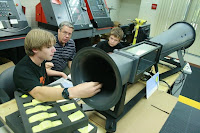At the industry end of the spectrum, manufacturing has experienced a dramatic growth. Michael Ennis, recipient of the 2009 FLATE Industry Distinguished Service Award states that American workforce demographics have significantly changed, making “manufacturing companies more efficient, effective and cost competitive as a result of competition from foreign manufacturers.” Ennis is a
 manufacturing engineer at Harris Corporation, and an adjunct professor at Brevard Community College where he teaches applied mechanics in the Harris-BCC applied associate of science degree in engineering technology. As reflected by FLATE’s “Made in Florida” industry tours, Ennis encourages manufacturing companies to “invite high school seniors for industry tours where they meet new-graduate engineers and hear of their personal experiences in college as well as in their first years of work”. He says the strength of Florida’s manufacturing industry lies in the “significant number of people who can do high- tech jobs in engineering, as well as entry-level manufacturing tasks”.
manufacturing engineer at Harris Corporation, and an adjunct professor at Brevard Community College where he teaches applied mechanics in the Harris-BCC applied associate of science degree in engineering technology. As reflected by FLATE’s “Made in Florida” industry tours, Ennis encourages manufacturing companies to “invite high school seniors for industry tours where they meet new-graduate engineers and hear of their personal experiences in college as well as in their first years of work”. He says the strength of Florida’s manufacturing industry lies in the “significant number of people who can do high- tech jobs in engineering, as well as entry-level manufacturing tasks”.The educational side of Florida manufacturing has also undergone some fundamental shifts. Jim Mathews, recipient of the 2009 Secondary Educator-of-the-Year award points to the developing “high-tech corridors” in Florida as beacons of collaborative efforts between businesses, technical schools and universities. Matthews has over 25 years of manufacturing and technology experience as an engineer, strategist, and senior level manager of technology businesses. Currently,
 he is an engineering technology teacher at Sarasota High School engaged in developing new technology courseware for companies.
he is an engineering technology teacher at Sarasota High School engaged in developing new technology courseware for companies.Mathews describes the school’s four-year manufacturing program as a vehicle to not only increase the entry and survival rates in technology careers, but to create leaders and outstanding performers in colleges and the workplace. His passion lies in ensuring students have a real-world view of manufacturing—one that connects their learning experience to future career opportunities.
At the post-secondary level, Norm Brahs, head machining instructor at Atlantic Technical Center and recipient of the 2009 FLATE Post-Secondary Educator-of-the-Year award firmly believes showcasing practical applications of the industry to students will help capture interest in careers/educational pathways in manufacturing. He points to FLATE’s “Made in Florida” website as a rich tool where educators and students can take advantage of some of the available resources.
Brahs wears many hats. He has been an enthusiastic leader in the Florida First Robotics competitions, and has led numerous teams to victory. He is also closely working with the South Florida Manufacturers Association, and 16-20 local companies to create an apprentice program at ATC. Brahs notes students most often are not aware of “how things are made”, and educators need to establish those “inroads” so students can “think about how products are manufactured". His suggestion for educators is to “have exercises that are fun, interesting and challenging at the same time".
Indeed, each of the awardees have made significant strides in augmenting manufacturing on a statewide level. Please join us in congratulating recipients of the 2009 FLATE awards. For more information, you can read an in-depth interview with the awardees on our Facebook page at www.facebook.com/madeinflorida.
News Clip: Jim Mathews, Secondary Educator-of-the-Year interviewed on TV







